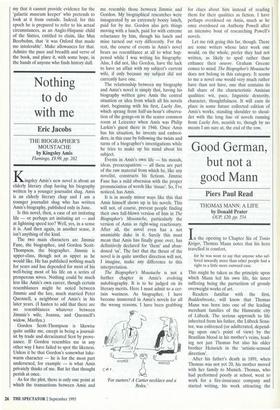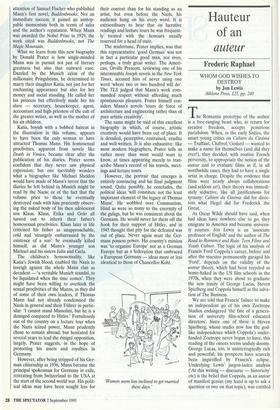Good German, but not a good Mann
Piers Paul Read
THOMAS MANN: A LIFE by Donald Prater OUP, £20, pp. 554 In the opening to Chapter Six of Tonio Kroger, Thomas Mann notes that his hero travelled in comfort, for he was wont to say that anyone who suf- fered inwardly more than other people had a right to a little more outward ease.
This might be taken as the principle upon which Mann led his own life, his inner suffering being the parturition of grossly overweight works of art.
Readers familiar with the first, Buddenbrooks, will know that Thomas Mann was born into one of the leading merchant families of the Hanseatic city of LObeck. The serious approach to life inherited from his father, the Lubeck Sena- tor, was enlivened (or adulterated, depend- ing upon one's point of view) by the Brazilian blood in his mother's veins, lead- ing not just Thomas but also his older brother Heinrich in the 'artistic-sensual direction'.
After his father's death in 1891, when Thomas was not yet 20, his mother moved with her family to Munich. Thomas, who had performed poorly at school, went to work for a fire-insurance company and started writing, his work attracting the attention of Samuel Fischer who published Mann's first novel, Buddenbrooks. Not an immediate success, it gained an unstop- pable momentum both in terms of sales and the author's reputation. When Mann was awarded the Nobel Prize in 1929, the work cited was Buddenbrooks, not The Magic Mountain.
What we learn from this new biography by Donald Prater is how single-minded Mann was in pursuit not just of literary greatness but also that outward ease. Dazzled by the Munich salon of the millionaire Pringsheims, he determined to marry their daughter ICatia, not just for her enchanting appearance but also for her money and social standing. He called her his princess but effectively made her his slave — secretary, housekeeper, agent, accountant and high priestess of the cult of the greater writer, as well as the mother of his six children.
Katia, boyish with a bobbed haircut in the illustration in this volume, appears to have been the only woman to have attracted Thomas Mann. His homosexual proclivities, apparent from novels like Death in Venice, became clear after the publication of his diaries. Prater seems confident that they never saw physical expression; but one inevitably wonders what a biographer like Michael Sheldon would have made of Mann's terror that the diaries he left behind in Munich might be read by the Nazis; or of the fact that the volume prior to those he eventually destroyed ends with him pruriently observ- ing the naked body of his then adolescent son Klaus. Klaus, Erika and Gob o all turned out to inherit their father's homosexual proclivities. Klaus later in life criticised his father as unapproachable, cold and 'strangely embarrassed by the existence of a son': he eventually killed himself, as did Mann's younger son Michael and his sisters Julia and Carla.
The children's homosexuality, like Katia's Jewish blood, enabled the Nazis to inveigh against the whole Mann clan as decadent — 'a veritable Munich scandal, to be liquidated when the time comes'. They might have been willing to overlook the sexual proclivities of the Manns, as they did of some of their own leaders, if Thomas Mann had not already condemned the Nazis in general and their Fiihrer in partic- ular: 'I cannot stand Mussolini, but he is a demigod compared to Hitler.' Fortuitously out of the country on a lecture tour when the Nazis seized power, Mann prudently chose to remain abroad, but hesitated for several years to lead the émigré opposition, largely, Prater suggests, in the hope of protecting his assets and royalties in Germany.
However, after being stripped of his Ger- man citizenship in 1936, Mann became the principal spokesman for Germany in exile, retreating from Switzerland to the USA at the start of the second world war. His polit- ical ideas may have been sought less for their content than for his standing as an artist, but even before the Nazis, his audience hung on his every word. It is extraordinary to hear that on lucrative readings and lecture tours he was frequent- ly treated with the honours usually reserved for a head of state.
The misfortune, Prater implies, was that this representative 'good German' was not in fact a particular good man, nor even, perhaps, a truly great writer. The Ameri- can, Orville Prescott, reviewing one of his interminable Joseph novels in the New York Times, accused him of never using one word 'where two or two hundred will do'. The TLS judged that Mann's work com- manded respect without affording much spontaneous pleasure. Prater himself con- siders Mann's novels 'tours de force of architecture and engineering rather than of pure artistic creativity'.
The same might be said of this excellent biography in which, of course, artistic creativity would have been out of place. It is detailed, perceptive, restrained, erudite and well-written. It is also exhaustive: like most modern biographers, Prater tells us rather more than most would want to know, at times appearing merely to tran- scribe Mann's record of his travels, meet- ings and lecture tours.
However, the portrait that emerges is entirely convincing and his final judgment sound. Quite possibly, he concludes, the political ideas 'will constitute not the least important element of the legacy of Thomas Mann'. He wobbled over Communism, blind as were so many to the enormity of the gulags, but he was consistent about the Germans. He would never let them off the hook for their support of Hitler, and in 1945 thought that pity for the defeated was out of place. Never again must the Ger- mans possess power. His country's mission was 'to organise Europe' not as a German Europe but as a federation that embraced a European Germany — ideas more or less identical to those of Chancellor Kohl.
'Women seem less inclined to get married these days.'



















































 Previous page
Previous page